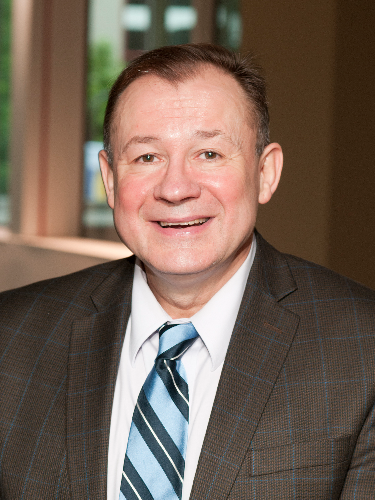Gerd Naydock
PsyD '15

Gerd Naydock (PsyD ’15)
Living in the Moment
In the span of five decades, Gerd Naydock (PsyD ’15) has lived about five lifetimes—and
none would be considered “easy.” As a very young boy, Dr. Naydock was taken out of
his mother’s care due to her battles with mental illness, and as a result, he largely
grew up in orphanages in Germany (where he was born) and in Baltimore. After the facility
in Baltimore closed when he was just nine years old, Naydock entered into that city’s
foster care system, where he remained until he “aged out” at 18. He nearly didn’t
finish high school, and when he did, higher education was not in the cards.
“The part of Baltimore I lived in was very industrial—one of the largest steel mills
in the world used to be there,” he explains. “So high school was geared toward teaching
vocational arts, and there wasn’t much encouragement to go onto higher education.”
Dr. Naydock followed that trend and worked at a paint factory as his first job. One
winter morning, he was heading to work, when he had an epiphany. “It was such a nasty
job, you could smell chemicals all the time, and I wondered, ‘Is this all there is?’”
he says. “I was so depressed I said to myself, ‘I have to get out of here!’ That drove
me to find a Marine recruiter and enlist.”
He enlisted at the age of 19, and worked as a Russian translator during a time when
the Cold War was in full swing. “It was the best thing I ever did in my life,” Naydock
says. “I realized I had a lot more spirit in me than I thought, and that maybe I could
apply myself academically.”
After his discharge, Naydock came to Philadelphia for a sales job, and began taking
classes at Villanova University, where he graduated magna cum laude with a bachelor’s
in history and psychology. He went on to eventually get his master’s degree in clinical
social work from Bryn Mawr College.
“I think I've been doing therapy since I was a kid,” he says. “I was a precocious
kid, I think, and adults—even my foster parents—would often tell me about their problems.
And I finally realized that maybe that’s what I was ultimately supposed to be doing.”
For the past 21 years he’s done exactly that as a clinical social worker. He has worked
in prisons, hospitals, private practice, hospices and managed care. Most recently,
he interned at PCOM’s Center for Brief Therapy, but prior to that, he worked for the
Veteran’s Administration. While there, he did outpatient therapy and also served as
a suicide prevention coordinator. He says his experience working with veterans, as
well as his own traumas growing up as an orphan, have fueled his interest in areas
such as post-traumatic stress disorder.
“What is it about people that helps them overcome things?” he says. “I think everyone
has that resilience in them. I did. I think it’s your belief about your past that
can either make you or break you—it shouldn’t really define you as a person.”
To that end, Dr. Naydock says that he has been able to overcome his own struggles
largely by focusing on the present moment—not the future or the past—and he brings
that into his therapy sessions with his clients.
“I think I realized that as a child, and I think that’s what ultimately saved me,”
he says. “I didn't get stuck in regrets and resentments and disappointments of the
past. And I can’t solve problems that haven’t happened yet, or may never happen. I
don’t get stuck in that cycle.”


